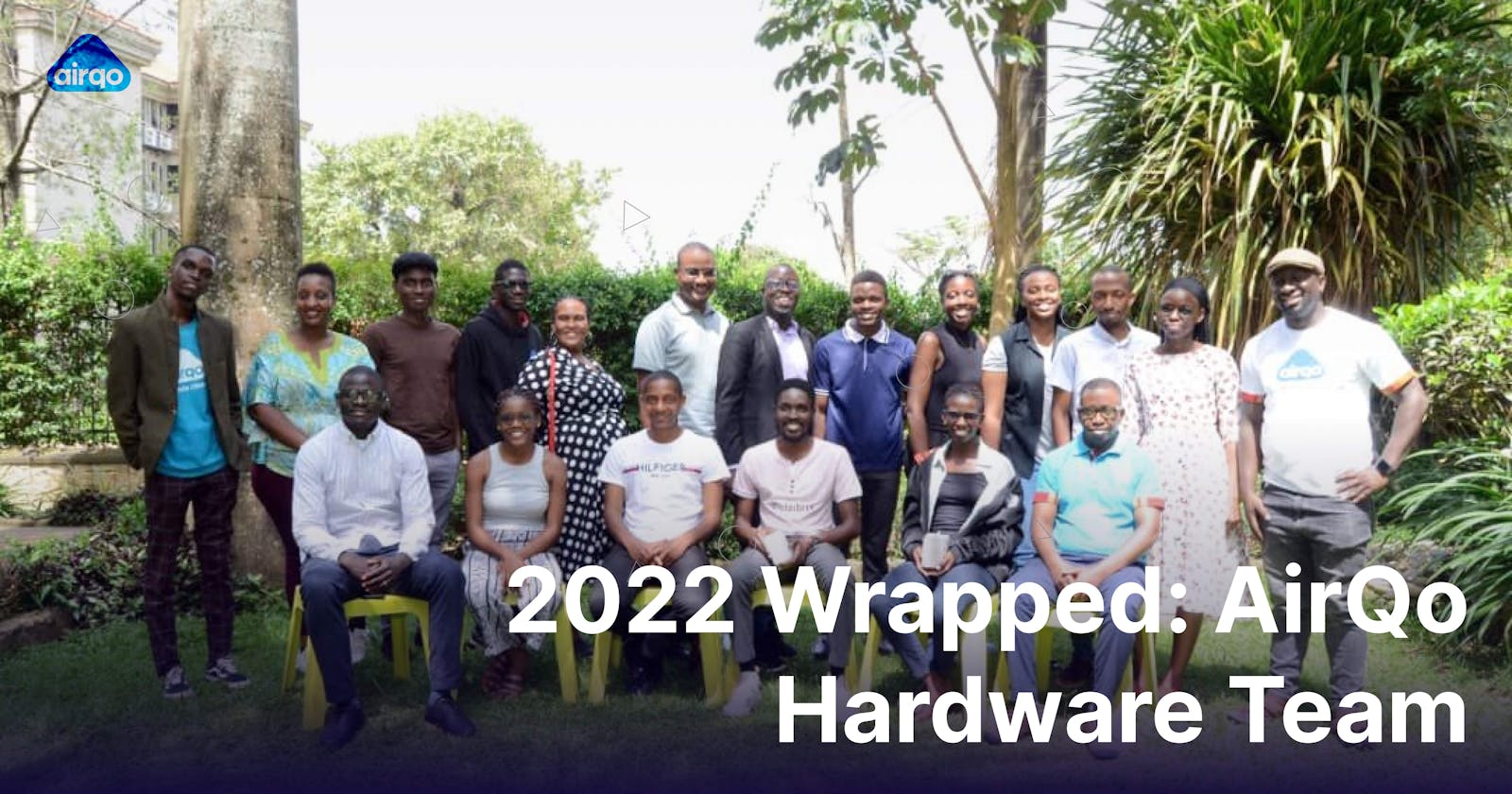As we reflect on the past year, the Hardware team took stock of what went well and what didn't go as planned in their work. In this post, we hear from our team of Embedded Systems and Network Support Engineers about their experiences and insights from the past year. From successes in cross-team collaboration and growth in coding and documentation, to challenges with device uptime and host relations. Our engineers also share their thoughts on what they plan to improve on in 2023.
Anold Nsubuga, Embedded Systems and Network Support Engineer - International Operations
What went well
Fully integrating well with the team
Appreciation of the growth in the device network and more streamlined/clear approach to categorization ie concept of AirQlouds
Cross-team collaboration
Growth in terms of coding and documentation
Progress in the documentation of the AirQo user manual
What didn't go well?
Failure to achieve the required uptime values/percentage
AirQo device hosts complaints
Unsuccessful developments of the Rev-C device
What I plan to accomplish and improve next year
Owning documentation of the hardware processes
Make the hardware workflow understandable to the other teams
Improve host relations by organizing timely checks and follow-ups
George William Settala, Embedded Systems & Network Support Engineer
What went well
Successful onboarding onto the AirQo team
Contributing to the hardware stock-take management system development and taking on the responsibility of being the Custodian
Contributing to the fast production of AirQo monitors and having a say in the look and design of the casing
Had an unforgettable retreat. Didn’t anticipate deeply bonding with team members. Really enjoyed the competitive exercise organized by Engineer which not only left us energized but picked transferrable lessons
In the due course of the year, we started working on all pending or untapped hardware documentation to ease future collaboration works
Did a lot of maintenance work to improve uptime to at least 85%
Had an engagement with GearBox company which went well and the core purpose of that was to seek ways to improve our production processes and acquire new skills from them that we could be missing out on
Had an engagement in setting up Lora gateway equipment to improve communications at Makerere University
What didn’t go well
Faced a shortage of some tools that hindered the production processes
Power outages that slowed down production processes. Also, lack of huge UPS power backups to provide power for at least an extended 9hrs in case of such occurrences
Lack of an extended eagle's eye to suggest better IoT tooling needed for the improvement of our air quality monitors
Failed to deploy new AirQo monitors to some of the international AirQlouds on schedule
What I plan to accomplish & improve next year
Continued International Expansion
Massive production of AirQo monitors
Continue training at Gearbox to improve production processes
Improve hardware documentation
Deo Okedi, Embedded Systems Engineer
What went well
Increased cross-team collaboration from the hardware perspective, bringing to light many rather obscure topics around device uptime, AirQlouds, and Colocation.
Documentation of hardware processes has improved, and we were able to contribute to the first draft of the device manual and installation guide together with the design team (Collaboration)
What didn't go well
Device uptime contributors are still unclear. Also, we aren't addressing the root issues. At some points, we might have been quick to prescribe solutions before fully analyzing some problems. This is evident in the current lack of a minimum viable product(MVP)
We also failed to have our devices shipped to AQSPEC for evaluation, an effort that would provide the first feedback from an established body, directly informing the hardware design and performance of the device
What we can do to improve in 2023
Embrace open source and sharing of design decisions. We are taking baby steps towards this by practicing GitHub usage in the hardware team
Deliberately separating RND from Production, which will provide space for proper experimentation of new ideas and design methodologies, while safely maintaining a stable MVP that's outward facing. Embrace cross-team collaboration on all fronts
Gideon Lubisia, Embedded Systems and Network Support Engineer – International Operations
What went well
Successful onboarding and integration with the team across the board
Support from the senior management to achieve project goals
Cross-team support in establishing international airqlouds, network infrastructure deployments, and knowledge sharing-Kisumu, Dakar & Douala
International partnerships with different stakeholders
Collaboration agreements with different cities and partners
Hardware documentation progress was encouraging
The first trial of decentralized device installation was successful.
The steps provided in the user guide were helpful
Virtual training and support of international partners on data access was a success with support from other teams
Increased percentage of solar-powered devices and establishment of several collocation infrastructures
What didn’t go well
Network management and uptime were our Achilles' heel.
International demand for devices and production not balanced
Research and reports are stuck in drafts and delayed publication targets
What we can do to improve
Standardize our deliverables - devices, demand, cross-team work, etc
Strengthen the role of Research and Development
Encourage unbiased product and service review - RND, design prototype, testing, quality assurance procedures, etc
Promote and strengthen cross-team participation in internal processes. International airqlouds targets, collaborations, and engagements require additional cross-team support.
What I plan to accomplish and improve next year
Contribute further towards research and publication - From draft to final research mindset
Lead international expansion works and increase collaborations in new cities
Align international device requirements with the needs
Take lead on device, hardware documentation, and operation standardization efforts
Improve support for international cities with project sensitization efforts, data access, network management, etc
Manage expectations well. International cities having different bureaucratic processes and requirements will require understanding and flexibility to deal with the dynamic and evolving requirements.
